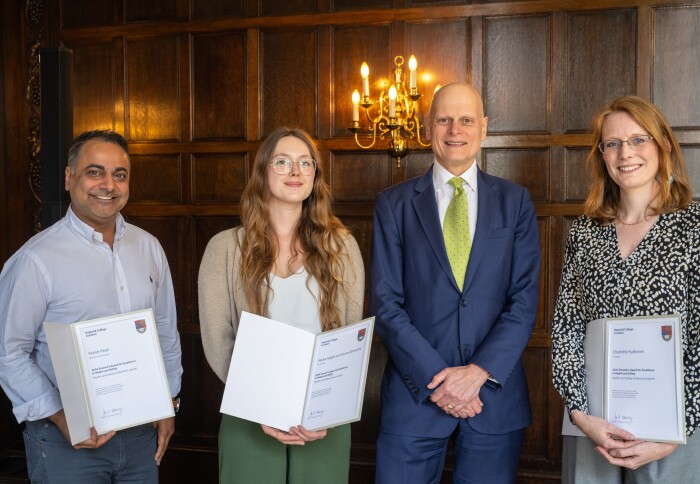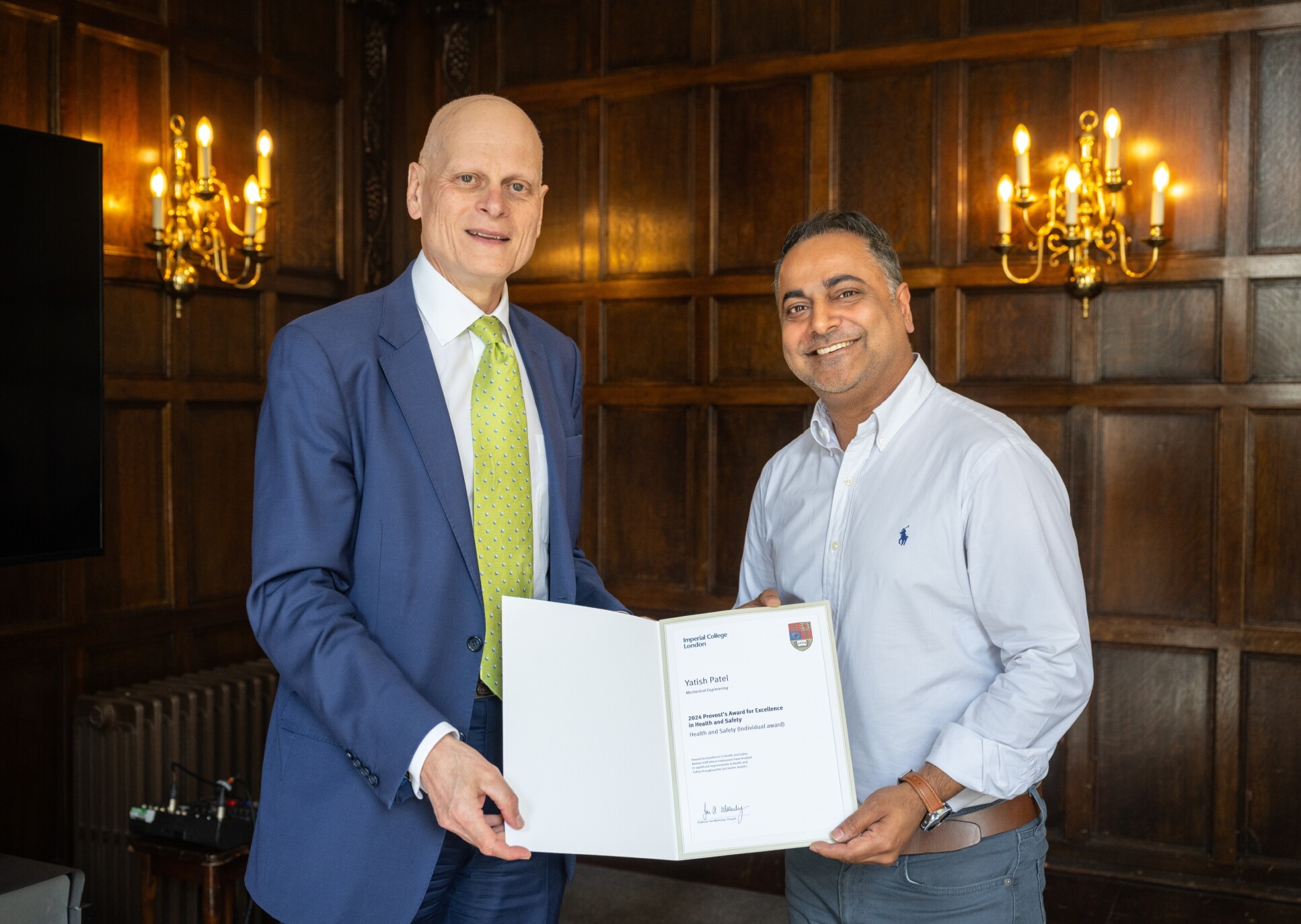Imperial staff honoured for health and safety achievements
by Maxine Myers

Staff in the departments of chemistry, life sciences, outreach and mechanical engineering have been honoured at the 2024 health and safety awards.
The Provost’s Awards for Excellence in Health and Safety, now in its ninth year, recognises staff whose endeavours have resulted in significant improvements in health and safety over the past year. They are made to individuals and teams for their outstanding commitment to improving the safety of students, staff and visitors to the university.
This year saw four winners in total – two individuals, one team award and a highly commended award. They were presented to:
• Sasha Angell, Laboratory Technician, and Emma Ransome, Lecturer, Department of Life Sciences
• Dr Charlotte Sutherell, Principal Teaching Fellow, Department of Chemistry
• Dr Yatish Patel, Advanced Research Fellow, Department of Mechanical Engineering
• Richard Brown, Reach Out Makerspace Technician, Outreach
At an awards ceremony that took place late last month, Professor Ian Walmsley, Provost of Imperial, said:
“I want to congratulate this year’s awardees for their innovative work to create a safer working environment for us all. Safe working enables Imperial to thrive in its academic mission, and this year’s awards showcase how seriously our colleagues take their safety responsibilities and our duty of care. Health and Safety is of the utmost priority at Imperial, and it is wonderful to see the many ways our great people are delivering this for our community.”
Improve laboratory safety
Sasha Angell and Emma Ransome – Team award

Sasha and Emma are part of a taskforce which aims to identify and rectify any gaps in the management of health and safety at Silwood Park campus such as lack of visible leadership.
"It is fantastic to see our work highlighted by the Provost and hope that our approach will be helpful for other laboratories around the university." Sasha Angell Laboratory Technician, Department of Life Sciences
Together, they implemented a safety management system for users of the Microbial Facility. This includes a system for all users of the laboratory to provide risk assessments and standard operating procedures.
The Microbial facility is used by more than 10 laboratory groups, as well as Master’s, PhD and postdoctoral students throughout the year. Undergraduate students also use the facility to do their final year projects at Silwood Park campus in the spring.
The system allows everyone working in the facility to see what work is being carried out, by whom, and what the risks are associated with that work. This clarity has provided users with increased confidence and allows the facility lead – Emma Ransome - and safety team to pick up on any issues more quickly.
Sasha said: 'We are incredibly grateful for this award. It is fantastic to see our work highlighted by the Provost and hope that our approach will be helpful for other laboratories around the university'.
Disability support
Dr Charlotte Sutherell – Individual award

Charlotte is the Department of Chemistry’s Department Disability Officer (DDO) and has worked to improve accessibility of the department’s teaching and social spaces for students to ensure they can be freely and safely used, irrespective of differences in mobility or health conditions.
"Hopefully the project highlights how important it is that the experience of being on campus for study or work is considered from diverse perspectives, including those of students and staff with disabilities." Dr Charlotte Sutherell Principal Teaching Fellow, Department of Chemistry
The project included finding creative solutions to limited fire evacuation routes for wheelchair users, coordinating with a number of university departments such as the Disability Advisory Service and faculty safety teams to put evacuation plans and training in place. In addition, Charlotte researched and sourced appropriate personal protective equipment (PPE) for students with specific health needs, reviewed risk assessments, and worked with colleagues on adjustments so practical sessions could be safely undertaken.
Charlotte said: “I feel honoured to receive this award and am grateful to everyone who gave time and expertise and their determination to find solutions.
“Hopefully the project highlights how important it is that the experience of being on campus for study or work is considered from diverse perspectives, including those of students and staff with disabilities. I find it very motivating that work to improve this has been recognised and valued.”
Battery safety support

Yatish’s research focuses on understanding the reasons why lithium-ion batteries degrade and the impact these have on safety.
"Battery safety awareness is crucial; it is the first step in preventing accidents and ensuring the safety of our working environment." Dr Yatish Patel Advanced Research Fellow, Department of Mechanical Engineering
The use and presence of lithium-ion batteries on campus have significantly increased over the last four years. E-scooters and e-bikes have become more prevalent as well as the increased use of laptops. New drone and robotic labs also use lithium-ion batteries to power their equipment.
The increased presence of lithium-ion batteries on site and the relative lack of awareness and appreciation of the hazards associated with their storage and use, increases the risk of a serious incident.
Yatish Co-Chairs the university’s Battery Safety Forum and has compiled and presented educational material on battery safety. He also reviewed policy and has advised on best practice for the information and communication technologies (ICT) department.
Yatish has also given his time and expertise to discuss e-scooter safety with the university’s security and initiated visits to labs across the university to review their battery use policies. This has directly influenced the computing departments’ approach to battery use and storage.
Yatish said: "Battery safety awareness is crucial; it is the first step in preventing accidents and ensuring the safety of our working environment. By understanding and respecting the potential hazards of batteries protects not only our campus but also our lives."
Making outreach work safer
Richard Brown - Highly Commended

Richard provides technical and teaching support for the Maker Challenge Programme – a programme offering young people in White City a chance to develop and create an idea – The programme operates in the Reach Out Makerspace.
The sessions carried out in the Reach Out Makerspace are often unstructured, which presents many difficulties in assessing risk and managing the equipment and tools that exist in the space.
“I don’t really do my job looking for accolades, I do it because I feel I can make a positive difference to the experiences of the disadvantaged young people that come through our doors, and hopefully enrich and inform their lives." Richard Brown Reach Out Makerspace Technician, Outreach
Richard has further created a safer working environment through rigorous record keeping, risk assessments and machine research which has enabled thousands of disadvantaged young people to access and enjoy workshops. As well as develop important new skills.
He has created new ways to facilitate participants’ needs, and their ideas and designs.
He worked in collaboration with Crisis – a charity for people experiencing homelessness – and offered sessions to adults with a range of varied and complex physical and emotional needs. For this series of activities, the workshop equipment needed to be adapted and the layout of the space adjusted.
He also worked with adults who were at risk of self-harming and developed a system of logging the use of potentially dangerous blades and had a clear record of who was using them and where they were.
Richard has now become a point of information for other organisations, charities and community groups seeking advice on setting up and running similar spaces.
Richard said: “I was unaware of my nomination and on holiday when the awards ceremony happened, so was truly and happily surprised to receive a High Commendation.
“I don’t really do my job looking for accolades, I do it because I feel I can make a positive difference to the experiences of the disadvantaged young people that come through our doors, and hopefully enrich and inform their lives.
I want to empower them in the important decisions they must make and try to break down barriers, perceived or otherwise, about opportunities available to them. Recognition of this type of work is always gratefully received though.”
Article text (excluding photos or graphics) © Imperial College London.
Photos and graphics subject to third party copyright used with permission or © Imperial College London.
Reporter
Maxine Myers
Communications Division